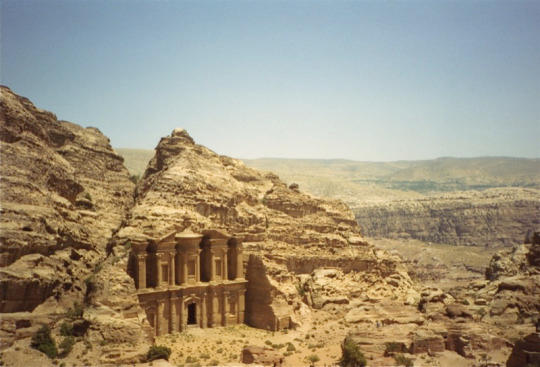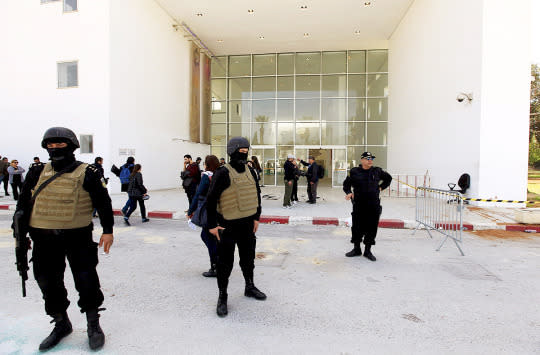Travel in the Age of ISIS: the Terrifying New Reality

An Islamic State of Iraq and the Levant fighter waves a Black flag during a military parade in the Raqqa province in Syria. (Photo: Handout / Alamy Stock Photo)
The ripple effects from attacks by the Islamic State and other militants may start in the Middle East and Europe, but they’re felt in the U.S. too. Emphasizing the fact that an attack can happen anywhere, U.S. officials have tightened security measures for flights coming from Mideast airports.
“You know while we can’t rule anything in or out, we have to consider the possibility that of potential terrorist involvement here,” White House press secretary Josh Earnest told reporters Friday.
This is travel in the age of ISIS, and the challenges it will create for tourism are likely here to stay. Those challenges are especially acute in the Mideast: the most recent example is the crash of a Russian commercial plane in Egypt – ISIS is claiming responsibility, and local investigators are “90 percent sure” that a bomb caused it, according to a Reuters report.
Since the crash, Egypt has tried to entice tourists by opening three tombs in Luxor for the first time. While this was planned before the plane disaster, the country had already been suffering from a reputation as a dangerous place to visit. Now, an Egyptian official estimates the country could lose 70 percent of its tourists.
The Middle East has a security problem to address with tourists thanks to a combination of the Arab Spring uprisings in 2011 and more recent attacks from militants. The reputation hit doesn’t always make sense: some countries’ tourism industries are thriving, others’ have taken big hits because of violence, and other countries are struggling to attract visitors despite no recent violence at all.

The Temple of Edfu – normally a popular tourist destination in Egypt – is practically empty, a sign of decreased tourism among Mideast countries. (Photo: AP Photo/Belal Darder)
Evidence of flat or sagging tourism in Mideast countries can be found in recent data, forecasts for 2015, and anecdotes from regional tour operators who cater to Americans.
“Leisure travel to the Middle East has been down exponentially since the Arab Spring,” Justin Huff, director of Africa, Middle East, and Polar Programs for adventure tour operator Mountain Travel Sobek, told Yahoo Travel. “The mindset of the American traveler to this region has now been completely altered due to the unrest.”
Related: Egypt Plane Crash: Is it Safe to Fly?
ISIS and other militants are hardly just a Mideast concern – consider France, which had the Charlie Hebdo attacks in January and the beheading of a man in Lyon in June by a suspect linked to ISIS. And it’s tough to correlate tourism numbers with fears about terrorism. But while France is projecting a record high for tourism in 2015, some Middle East countries with no recent attacks, such as Jordan and Morocco, are struggling for no other apparent reason.
“It seems to be the convoluted logic of, ‘ISIS are Arabs, there are Arabs in Morocco, therefore there is ISIS in Morocco,” Piotr Kostrzewski, a Morocco scholar and tour operator with Cross Cultural Adventures, told Yahoo Travel.
Here’s a look at how various Mideast countries are doing:
Hotspots that have cooled off

Beautiful and exotic Morocco is among the places where tourism has dwindled in recent years due to negative perceptions. (Photo: iStock)
Morocco, an accessibly exotic country renowned for its spicy foods, hammams, and medinas, remains a popular place: Marrakesh was named the world’s favorite destination on TripAdvisor this year, for example. But after more than doubling its tourism from 2002 to 2011, its numbers have been flat since. The World Travel & Tourism Council estimates Morocco’s tourism will dip from 10.2 million tourists last year to 9.8 million in 2015.
“No terrorism activity of any kind has occurred since a “lone-wolf” bomb attack on a Marrakech café in 2013,” Kostrzewski said of Morocco. “Nevertheless, tourism there has been affected as well, due to perceptions.
“All my contacts in Morocco report that this summer has basically been ‘dead’ for tourism. …. Normally at this time of year I am busy booking end-of-year holidays for families, yet so far have had no requests for this year’s Christmas season. Yet, at the same time, there are enough tourists still coming in that no-one has raised red flags about loss of jobs or hotel/restaurant closings.”
Turkey is another travel favorite that’s taking a hit this year, though unlike Morocco it has seen violence: more than 100 people were killed by a bomb attack in Ankara last month, and ISIS is suspected. It’s the deadliest attack in the country’s modern history.

Stunning and culturally rich Turkey has also experienced a major drop in tourism due to to travelers believing it is unsafe. (Photo: Getty Images)
Even before the attack, Turkey was seeing flat or dropping tourism numbers this year thanks in part to a sharp decline in Russian tourists. The country’s ministry of tourism reported a 2.31 percent drop year over year in September, and tourism revenues dropped 4.4 percent to $12.29 billion in the third quarter of this year, according to the Turkish Statistics Institute. Hotels have been struggling to fill beds.
“Yes, we have seen cancellations because of the bombing and surprisingly not just from the U. S. but from Asia as well,” said Earl Starkey, who specializes in Turkey travel with Protravel International. “I still think Turkey is as safe as anywhere, but people on vacation deserve to feel safe.
“It is a pity because Turkey has so much to offer in terms of history, luxury, beautiful coastlines and unusual terrains. It remains one of the great destinations in the world. We are hoping that by next year this horrific event will fade from people’s minds and they will again come here.”
Related: What Americans Get Wrong About Turkey
Egypt has likewise been hard hit ever since the Arab Spring uprisings – after drawing 14.7 million tourists in 2010, it got only 9.9 million last year, with tourism minister Hisham Zaazou telling Reuters he expects that total to reach 10 million in 2015, below the forecasted 11 million. That was, of course, before the recent plane crash. Tourism revenues have fallen from a high of $12.5 billion in a year to an estimated $7.5 to $8 billion this year that could end up much lower now.
Related: When You Can’t Go Home: My Last Visit to Syria Before ISIS
Not helping Egypt’s cause has been a series of ISIS-related attacks in Cairo and elsewhere.
“Initially, it looked like a positive change when [President Hosni] Mubarak fell from power, Huff of Mountain Travel Sobek said. “But the changing of the guard in Egypt led to massive instability, including attacks all throughout the country most recently, some in Luxor on tourists.”
Inexplicably empty

Jordan – home to popular tourist spots Wadi Rum and Petra – has been unusually devoid of visitors. (Photo: Charlie Phillips/Flickr)
Jordan is a beautiful cocoon of safety in the Middle East, surrounded by the likes of Iraq, Syria, and Saudi Arabia. It offers one of the world’s greatest sites – the ancient city of Petra. Yet few tourists are visiting such treasures as Wadi Rum, and Petra sits strangely empty.
Al Jazeera reported that Jordan’s tourism over the first four months of 2015 dropped 40 percent from the same period last year. “We are paying a tax for being in the middle of an inflamed region,” Abul Razaq Arabiat, the head of Jordan’s Tourism Board, told the site.
The untouchables

Despite recent attacks in Jerusalem, Israel’s tourism is at its highest ever. (Photo: iStock)
While terrorism may be hurting Turkey’s and Egypt’s bottom line with tourists, this has not been the case in Israel despite its own violence. Three people were killed and 20 injured in October during a spate of attacks in Jerusalem, which has long been a hotbed of religious tension.
Israel’s tourism ministry is estimating 700,000 American visitors in 2015 – the highest number ever.
Among Muslim countries, the biggest outlier that seems immune to a dangerous reputation with Westerners is the United Arab Emirates. According to the WTTC, its tourist arrival numbers have risen every year since 2009, up to a projected 14.8 million in 2015.
To lesser extents, Oman and Qatar have been resilient, with their visitor numbers rising each year since 2011, according to the WTTC. But their overall tourism numbers are still relatively modest, with a projected 2 million and 2.9 million arrivals this year.
Related: The Ancient Oasis Towns of Oman: An Explorer’s Dream
One footnote to this category: despite a series of attacks this year Saudi Arabia is untouchable as a travel destination in its own way, with tourist arrivals projected to rise to 15.6 million this year. However, the vast majority of the country’s visitors have historically not come from the West but from Muslim pilgrims to Mecca.
Mortally wounded

The recent attack at the Bardo Museum was just one of several incidents where tourists in Tunisia were killed by an act of terrorism. (Photo: Anis Mili/Reuters/Corbis)
One attack on tourists was enough to seriously harm tourism to Tunisia, as happened in March when 22 people were killed at the Bardo Museum – ISIS claimed responsibility. But a fatal blow was struck in July, when 38 European tourists were shot dead at a hotel in Sousse.
Tunisia’s government estimates its tourism sector will lose $500 million this year, and that tourist arrivals dropped 20 percent to 4 million in the first eight months of 2015. The country has recently been getting buzz as a destination for Star Wars tourism because of the upcoming movie, but that’s unlikely to create even a blip.
Kostrzewski of Cross Cultural Adventures also specializes in tours to Tunisia, and said tourism had slowed to “just a trickle of independent visitors” since the attacks, and that Tunisia’s tourism sector stood to lose 400,000 jobs, despite new security measures.
“I, for one, believe the liability risks are too severe for now and thus am awaiting the end of this year, to see if no other disaster happens, i.e., if the country’s security apparatus is being efficient,” he told Yahoo Travel. “I’ll reconsider in consequence as of early 2016.”
Should you go?

Travelers are still strongly discouraged from visiting Iraq and Syria. (Photo: Getty Images)
In all the destinations mentioned here, even Tunisia, your chances of enjoying a culturally rich, peaceful vacation are far higher than being a victim of terrorism or unrest. With preparation and vigilance, such as knowing where your local embassy is and avoiding violence-prone areas, you can increase your odds of a safe trip.
When contacted by Yahoo Travel, U.S. State Department official William B. Cocks did point out some places to avoid:
“To be clear, travel to Iraq and Syria remains very dangerous and the U.S. government strongly discourages U.S. citizens traveling to Iraq or Syria to fight against ISIL,” Cocks said. “U.S. citizens should avoid areas near the Syrian, Turkish, or Iranian borders, which are especially dangerous and not always clearly defined.”
The State Department offers country-by-country updates for travelers, with information on any recent unrest, plus Travel Warnings with specific regional threats and more limited Travel Alerts. It also offers the STEP program, where travelers can receive information wherever they are and be easier for their loved ones to locate in case of emergency.
WATCH: Heaven on Earth: The Hidden Oasis of the Arabian Desert
Let Yahoo Travel inspire you every day. Hang out with us on Facebook, Twitter, Instagram, and Pinterest. Check out our original adventure travel series, “A Broad Abroad.”
